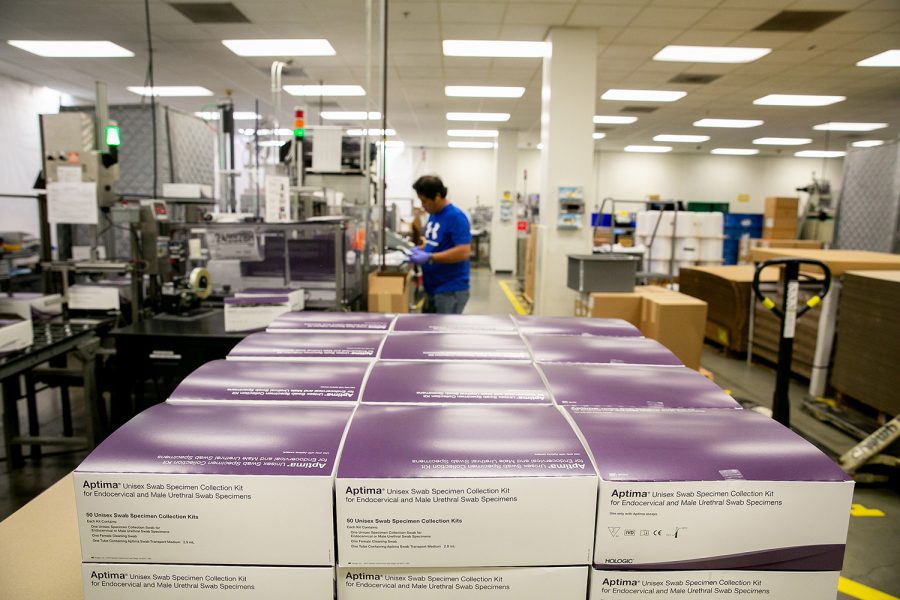STD tracing in Iowa disrupted as COVID-19 cases rise
With healthcare focusing on COVID-19, less resources are able to be allocated towards tracing sexually transmitted diseases.
Unisex collection kits are packaged for distribution at the Hologic Inc. plant on June 17, 2019, in San Diego. Hologic is the first in the U.S. to win FDA approval to test for mycoplasma genitalium, a bacteria of growing concern nationwide. (Sam Hodgson/San Diego Union-Tribune/TNS)
September 2, 2020
Shannon Wood normally traces STD cases in Iowa, but the specialist in the Iowa Department of Public Health’s Sexually Transmitted Disease Program has changed tactics. From April through August, she’s had to focus her expertise to trace another disease: COVID-19.
Wood said the department has had fewer resources to trace sexually transmitted diseases and infections since the pandemic began, although the Iowa Department of Public Health is still tracing cases of HIV and early stages of syphilis.
“We’ve actually done less of [STD contact tracing], because we were pulled to work on COVID-19 contact tracing,” she said. “We completely stopped doing contact tracing for gonorrhea.”
According to the Iowa Department of Public Health 2019 Disease Surveillance Data Report for Chlamydia, Gonorrhea, and Syphilis, there were a total of 21,716 of these infections in Iowa. Compared to the 2018 report, that’s 1,909 more cases.
Infographic by Joseph Maas/The Daily Iowan
Kathryn Edel, Johnson County Public Health Department health educator, said her department also has not been able to test as frequently as it did before the first COVID-19 cases were reported in March.
“That’s dramatically changed the level of access,” she said.
The department previously offered free rapid testing Monday through Friday in the clinic located in the Human Services Building, Edel said, but now only offers tests via appointment.
Wood said for the Iowa Department of Public Health, there is less money for testing resources in Iowa.
“The STD program is losing some money and that money pays for the testing at some sites, and then the treatment – so there’s a lack of places for people to go,” she said. “We used to be able to do field visits to go out and meet with the client and help them get to a doctor and transport, and now we are not able to do that because of COVID.”
Edel said that in Johnson County, the public-health workers partner with a number of nonprofits to offer free rapid testing.
But in rural regions, many are without the health-care resources that urban areas such as Johnson County have access to. Wood said patients can be left adrift.
“If there’s one Planned Parenthood in a five-county area in northwest Iowa and it closes, where are these people going to go?” Wood said. “Nowhere, and so they end up in an ER with pelvic inflammatory infection because they never were able to make it to the clinic.”
The University of Iowa Student Health offers free STI testing to all UI students, according to its website.
President of Student Advocates for Planned Parenthood Zoe Trager said that for students at the UI, it is still “super easy to go out and get tested” during the pandemic.
Every year, UI Student Wellness completes the National College Health Assessment after spring break. Stephanie Beecher, a senior UI behavioral health consultant, said because students went home because of COVID-19 last spring, they had to cancel the assessment.
She said the public-health crisis has disrupted data collection at colleges and universities, which lead to a lack of data and understanding of STD numbers.
“It is usually in-person and we have been doing it for 20-plus years,” Beecher said of data collection. “COVID hit … and it is the first year ever that we had to cancel.”







